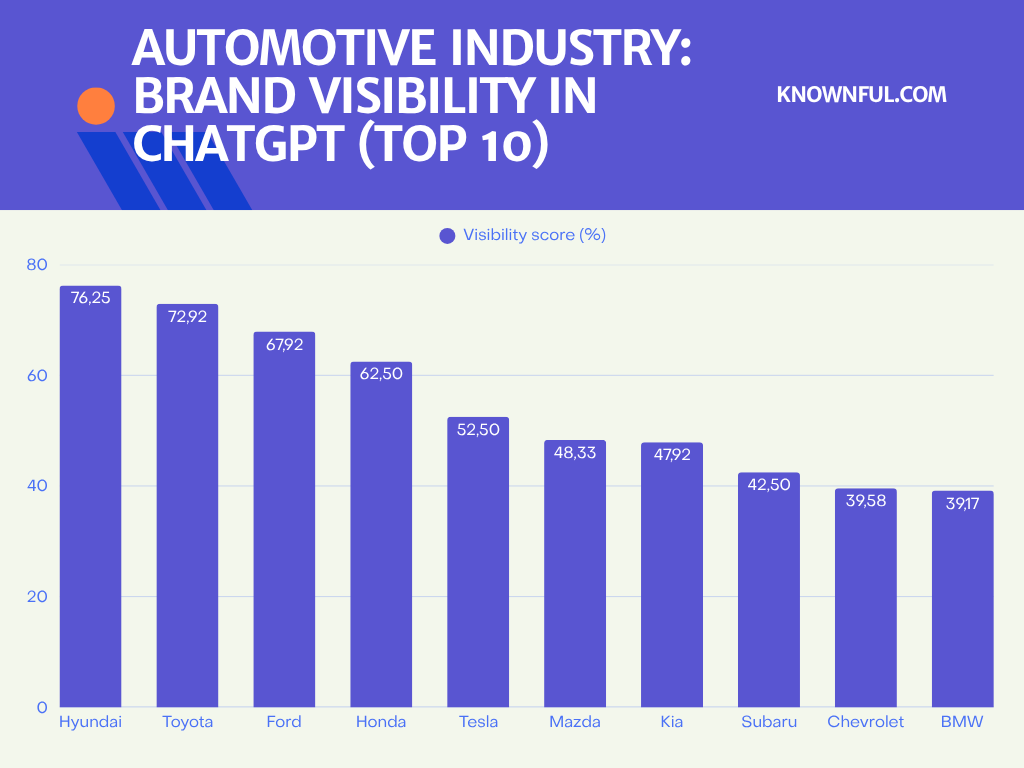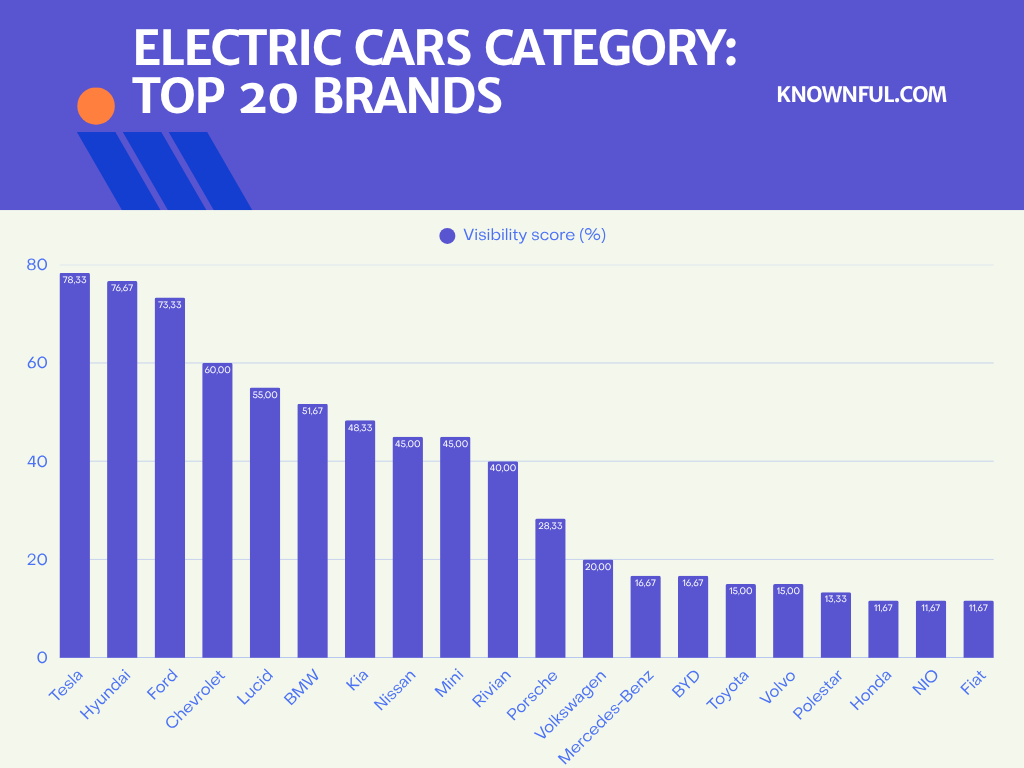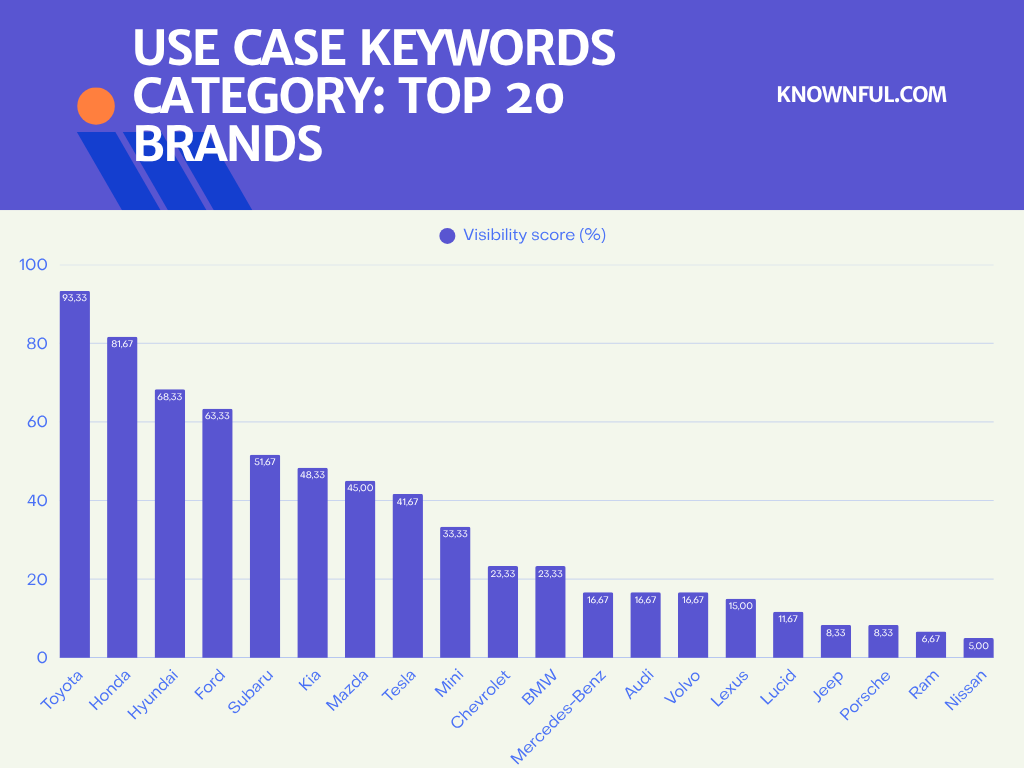What happens when you ask ChatGPT which car to buy? I spent a weekend finding out—and the results challenged everything I thought I knew about the automotive industry.
As AI-powered search replaces traditional Google queries, a critical question emerged: Which car brands actually appear in AI recommendations?
I started noticing a pattern. When people asked ChatGPT for car recommendations, certain names appeared repeatedly. Others—including pure-EV startups backed by billions and iconic luxury brands—were conspicuously absent.
This wasn’t just interesting. It was a preview of how the next generation discovers and chooses their cars.
I applied Knownful methodology to the automotive sector—tracking which brands win ChatGPT’s recommendations and which ones don’t exist in AI’s understanding of cars.
This is what I found.
The research

I applied our systematic brand monitoring approach to the American automotive market, analyzing how ChatGPT recommends cars across the most competitive search queries.
Interested in understanding your brand’s AI visibility compared to competitors? I can provide a complete private audit with visibility data, competitive analysis, and a personalized 10-minute video breakdown. Contact me →
The scope and methodology:
- 50 automotive brands (from Tesla to Hyundai, Ford to BYD, Rivian to Ferrari)
- 80 high-competition automotive keywords representing car buyers’ actual search behavior:
- “best electric car”
- “best hybrid car”
- “best car under 30k”
- “most reliable car”
- “best family car”
- “best car for commuting”
- “best sports car under 50k”
- etc.
- Keywords clustered in 4 main categories: EV, General keywords, Price, and Use case
- 240 total queries (3 queries per keyword for consistency)
- 5,178 AI-generated brand mentions analyzed
The visibility score represents the percentage of queries in which a brand was mentioned. For example, if Hyundai appeared in 183 out of 240 queries, its visibility score is 76.25% (183 ÷ 240 × 100).
These weren’t random queries—I selected some of the most competitive search queries in the automotive sector, the ones that actually influence purchase decisions.
The question: Which car brands win ChatGPT’s recommendations for the searches worth millions in customer acquisition?
The four numbers that matter

After analyzing 5,178 AI-generated mentions across 50 brands, four key metrics emerged:
76.25% — Hyundai’s AI visibility score. It appears in 183 out of 240 automotive queries—establishing dominant status in AI recommendations.
22% — The percentage of brands with zero AI visibility. 11 out of 50 automotive brands don’t exist in AI’s understanding of cars.
32.19% — The market share controlled by three brands. Hyundai, Toyota, and Ford capture nearly a third of all AI brand mentions.
16.98% — Two websites dominate AI’s automotive knowledge. U.S. News and Edmunds alone represent 17% of all cited sources.
These aren’t just statistics—they’re signals of a massive shift in how car buyers discover brands.
Finding #1: Japanese and Korean brands dominate (and it’s not even close)

The data reveals a stark pattern. 3 of the top 4 brands are all Asian manufacturers: Hyundai (76.25%), Toyota (72.92%), Ford (67.92%), and Honda (62.5%).
Here’s what jumps out immediately: Tesla—despite being synonymous with electric vehicles—sits at #5 with just 52.5% visibility.
Wait, what?
The brand that dominates EV headlines, sells hundreds of thousands of cars, and revolutionized the industry is… fifth?
The visibility gap is stark. By position #5, visibility has fallen by nearly 24 percentage points compared to Hyundai. Traditional Asian brands aren’t just competing—they’re winning decisively.
The middle tier tells an interesting story. Brands like Mazda (48.33%), Kia (47.92%), and Subaru (42.5%) cluster around 40-50% visibility—solid presence but far from the top.
The bottom half reveals concerning patterns. Premium German brands like BMW (39.17%), Mercedes-Benz (17.92%), and Audi (13.75%) struggle despite their market position. Even worse, pure EV startups like Rivian (12.92%) and Lucid (19.17%) barely register.
So the #1 insight is that traditional Asian manufacturers capture the majority of AI recommendations, while EV-native startups and European luxury brands fight for the margins.
Interested in understanding your automotive brand’s AI visibility compared to competitors? I can provide a complete private audit with visibility data, competitive analysis, and a personalized 10-minute video breakdown. Contact me →
Finding #2: Category winners reveal surprising patterns
The aggregate numbers tell one story. But category-level data reveals where different strategies win—and where assumptions break down completely.
EV Category: Tesla leads, but traditional brands are right behind

Top 5 in EV queries:
- Tesla — 78.33% visibility
- Hyundai — 76.67% visibility
- Ford — 73.33% visibility
- Chevrolet — 60% visibility
- Lucid — 55% visibility
Tesla does lead the EV category, but barely. Hyundai trails by just 1.66 percentage points. Ford is only 5 points behind.
Here’s the surprise: Traditional automakers have successfully positioned themselves as EV leaders in AI’s understanding. Their decades of content, marketing, and media coverage translated into EV credibility—even if their EV lineups are relatively new.
The real losers? Pure EV startups. Rivian sits at 40%, Polestar at 16.67%, and brands like Fisker, Canoo, and Aptera have zero visibility despite raising hundreds of millions specifically to build electric vehicles.
General keywords: Where brand recognition matters most

Top 5 for “best car” type queries:
- Hyundai — 91.67% visibility
- Toyota — 88.33% visibility
- Honda — 83.33% visibility
- Kia — 70% visibility
- Tesla — 68.33% visibility
When queries are broad (“best car,” “most reliable car”), Asian brands dominate completely. The top 4 are all Japanese or Korean manufacturers with decades of reliability reputation.
Tesla, despite its innovation narrative, drops to #5. Why? AI learns from what’s written about you—and decades of Consumer Reports reliability data carry weight.
Price category: Toyota crushes everyone

Top 5 for price-focused queries:
- Toyota — 95% visibility
- Mazda — 86.67% visibility
- Ford — 75% visibility
- Honda — 73.33% visibility
- Hyundai — 68.33% visibility
Toyota achieves near-perfect visibility for price-related queries. When someone asks “best car under 30k” or “best value car,” Toyota dominates.
This isn’t luck—it’s decades of content around value, reliability, and total cost of ownership. The Corolla and Camry are synonymous with affordable reliability in the training data.
Use case category: Toyota wins again

Top 5 for use-case queries (family, commuting, first car, etc.):
- Toyota — 93.33% visibility
- Honda — 81.67% visibility
- Hyundai — 68.33% visibility
- Ford — 63.33% visibility
- Subaru — 51.67% visibility
Practical use cases? Toyota dominates. When people ask about family cars, commuter vehicles, or first cars, Toyota appears in 93% of responses.
If you’re leading marketing at an automotive brand and want to discuss strategies to improve your AI visibility, feel free to reach out. Contact me →
Finding #3: The Big 3 capture 32% of all brand mentions
The top 3 brands—Hyundai, Toyota, and Ford—capture 32.19% of all brand mentions.
Nearly one-third of the conversation.
I expected competition in the automotive sector. What I didn’t expect was this level of concentration.
Let that sink in: 3 brands out of 50 (just 6%) represent nearly a third of how AI talks about cars.
This concentration matters for two reasons:
- Discovery advantage: When ChatGPT recommends cars, these three brands appear in nearly every conversation. They’re always “in the consideration set.”
- Compounding effect: The more AI mentions a brand, the more that brand becomes associated with automotive excellence in future training data. Success breeds more success.
For the other 47 brands? They’re fighting for the remaining 68% of mentions—and many are getting close to zero.
Finding #4: The pure EV startup surprise (they’re invisible)
This was the finding that shocked me most.
Remember all the hype about EV startups disrupting the industry? About how companies like Rivian, Lucid, and Polestar would revolutionize transportation?
The data tells a different story.
EV startup performance:
- Rivian: 12.92% visibility
- Lucid: 19.17% visibility
- Polestar: 5.83% visibility
- Fisker: 0% visibility
- Canoo: 0% visibility
- Lordstown Motors: 0% visibility
Billions in funding. Zero AI visibility for most.
Putting this in context
The 80 keywords analyzed span multiple categories—many of which naturally favor established players. General automotive queries, price comparisons, and use-case questions tend to reward decades of content and brand recognition.
Pure EV startups were built for one thing: electric vehicles. Yet even in the EV category specifically, the picture is concerning:
- Rivian: 40% visibility (vs. Ford’s 73.33%)
- Lucid: 55% visibility (vs. Hyundai’s 76.67%)
- Polestar: 16.67% visibility
These companies have:
- Billions in venture capital
- Cutting-edge technology
- Modern marketing teams
- Strong social media presence
Yet in AI recommendations? They barely exist.
Why this matters
As car buyers—especially Gen Z and younger Millennials—increasingly use ChatGPT for purchase research, invisibility = irrelevance.
If AI doesn’t recommend your brand, younger buyers won’t even know to Google you.
The path forward for EV startups

Based on the data, I’d recommend a clear strategy:
1. Expand content coverage: Most EV startups focus narrowly on their hero product. Create content around adjacent topics—EV ownership guides, charging infrastructure, sustainability, comparison content.
2. Get on comparison sites: Traditional brands dominate U.S. News and Edmunds (see Finding #5). EV startups need aggressive outreach to automotive comparison sites.
3. Build editorial authority: Create dedicated content hubs. AI learns from what’s written about you AND what you write. Most EV startups have minimal blog content compared to traditional manufacturers.
4. Invest in strategic PR: AI learns from media coverage. A single feature in Car and Driver or Edmunds has more impact than 100 Instagram posts.
The underlying challenge? Traditional brands didn’t deliberately optimize for AI visibility—they built it through 20+ years of content, PR, and reputation. EV startups are 5-10 years old with limited content footprints.
But here’s the advantage: Startups are more agile. They can build AI visibility deliberately and faster than legacy institutions can adapt.
The current low visibility isn’t a ceiling—it’s a starting point. But only for startups that treat AI visibility as a strategic priority, not an afterthought.
If you’re leading marketing or growth at a car manufacturer and want to discuss strategies to improve your AI visibility, feel free to reach out. Contact me →
Finding #5: 2 websites dominate AI sources

When I extracted the sources ChatGPT cited, one pattern became impossible to ignore:
U.S. News: 103 mentions (8.49% of all sources)
Edmunds: 103 mentions (8.49% of all sources)
Combined: 206 mentions = 16.98% of all AI sources
Two websites. Nearly one-fifth of AI’s automotive knowledge.
The top 10 website sources
Here’s where AI learns about cars:
- U.S. News (103 mentions)
- Edmunds (103 mentions)
- Toyota.com (95 mentions)
- Tesla.com (90 mentions)
- Consumer Reports (86 mentions)
- Car and Driver (84 mentions)
- HyundaiUSA.com (73 mentions)
- KBB (Kelley Blue Book) (61 mentions)
- Chevrolet.com (53 mentions)
- Honda.com (50 mentions)
Notice the pattern: Comparison and review sites rank #1, #2, #5, #6, and #8. Then manufacturer websites.
Strategic implication
If you want AI to recommend your car brand, you need to:
1. Own your manufacturer website content — Top brands (Toyota, Tesla, Hyundai) have rich, comprehensive content. AI cites them frequently.
2. Get featured on comparison sites — U.S. News, Edmunds, Consumer Reports, Car and Driver, and KBB drive AI recommendations. One strong review on these sites > 100 press releases.
3. Create citeable content — AI doesn’t just read; it needs structured, comprehensive information. Comparison tables, buyer’s guides, detailed specs.
The brands winning aren’t necessarily spending the most on advertising. They’re creating the content AI actually uses.
If you’re leading marketing or growth at a car manufacturer and want to discuss strategies to improve your AI visibility, feel free to reach out. Contact me →
What this means for car brands

If you’re at a traditional manufacturer (Toyota, Honda, Ford)
Your advantage is temporary.
Right now, you’re winning because of historical content, decades of reliability data, and brand recognition. But that advantage erodes with every new training data update.
What you should do:
- Monitor your AI visibility quarterly — Don’t get complacent
- Invest in fresh, comprehensive content — AI loves recent, detailed information
- Double down on comparison sites — That’s where AI learns
- Own specific categories — Even Toyota doesn’t dominate everywhere
If you’re at an EV startup (Rivian, Lucid, Polestar)
You currently have a fraction of the AI visibility of traditional brands.
What you should do:
- Content explosion — 10x your content output, especially educational and comparison content
- Get on comparison sites aggressively — Pursue U.S. News, Edmunds, Consumer Reports placement
- Move fast — You’re more agile than big manufacturers. Use it.
- Focus on your category — You may never win “best family car,” but you can own “best luxury EV”
If you’re at a luxury brand (BMW, Mercedes, Audi)
Many luxury brands have surprisingly low AI visibility given their market position and budgets.
What you should do:
- Build content depth — Luxury buyers research extensively. Give AI comprehensive information
- Own your category — “Best luxury sedan” and “best performance car” should be yours
- Get listed aggressively — Increase presence on comparison sites
- Create comparison content — AI loves head-to-head comparisons. Control the narrative.
One analysis, countless strategic insights
What started as a question about AI recommendation patterns became a comprehensive study of how automotive brands exist—or don’t exist—in the AI-powered future.
The 22% of brands with zero visibility aren’t small startups. They include billion-dollar companies and iconic luxury nameplates.
The traditional brands dominating today aren’t guaranteed winners tomorrow. Their advantage is based on historical content, not deliberate AI strategy.
The EV startups currently losing have time to adapt—but they need to act now. They’re more agile and can move faster than legacy players.
As AI-powered search becomes mainstream, the cost of invisibility compounds.
At Knownful, we’re tracking this shift across industries—helping brands understand where they stand and how to adapt before it’s too late.
Want your brand’s private AI visibility analysis?
Using the same systematic methodology that powered this automotive study, Knownful can analyze your brand’s visibility in ChatGPT.
Contact me →
What you’ll receive:
📹 10-minute video walkthrough
I’ll explain your results, show where you stand vs. competitors, and highlight the key patterns in the data.
📊 Complete Excel dataset
- Summary tab: Key findings and visibility scores at a glance
- Overall visibility scores: Your brand vs. competitors—mention frequency and visibility ranking
- Category breakdown: Visibility scores and mention counts by keyword category (EV, Price, Use case, etc.)
- Complete data tab: Full ChatGPT responses for each keyword, with all brand mentions
- Top domains cited: Which websites ChatGPT references most frequently in your industry
- Top URLs cited: Specific pages and sources driving AI responses
Limited capacity to ensure quality and depth.
About Knownful & this research
Knownful is a platform and media dedicated to tracking and analyzing brand visibility across AI models. This case study showcases our methodology applied to the American automotive sector.
Our approach combines:
- Systematic AI query analysis across multiple categories
- Source attribution tracking to understand where AI learns
- Competitive benchmarking at scale
- Actionable recommendations for visibility improvement
This automotive analysis represents our second major industry deep dive. Future studies will cover additional sectors as AI-powered search continues to reshape brand discovery.
Research Transparency:
- No conflicts of interest: no brands paid for inclusion or exclusion
- Methodology: fully documented throughout this report
Questions about methodology or findings? Want to discuss your brand’s AI visibility strategy?
Share This Research:
Found this valuable? Help others discover how AI is reshaping automotive brand visibility.


